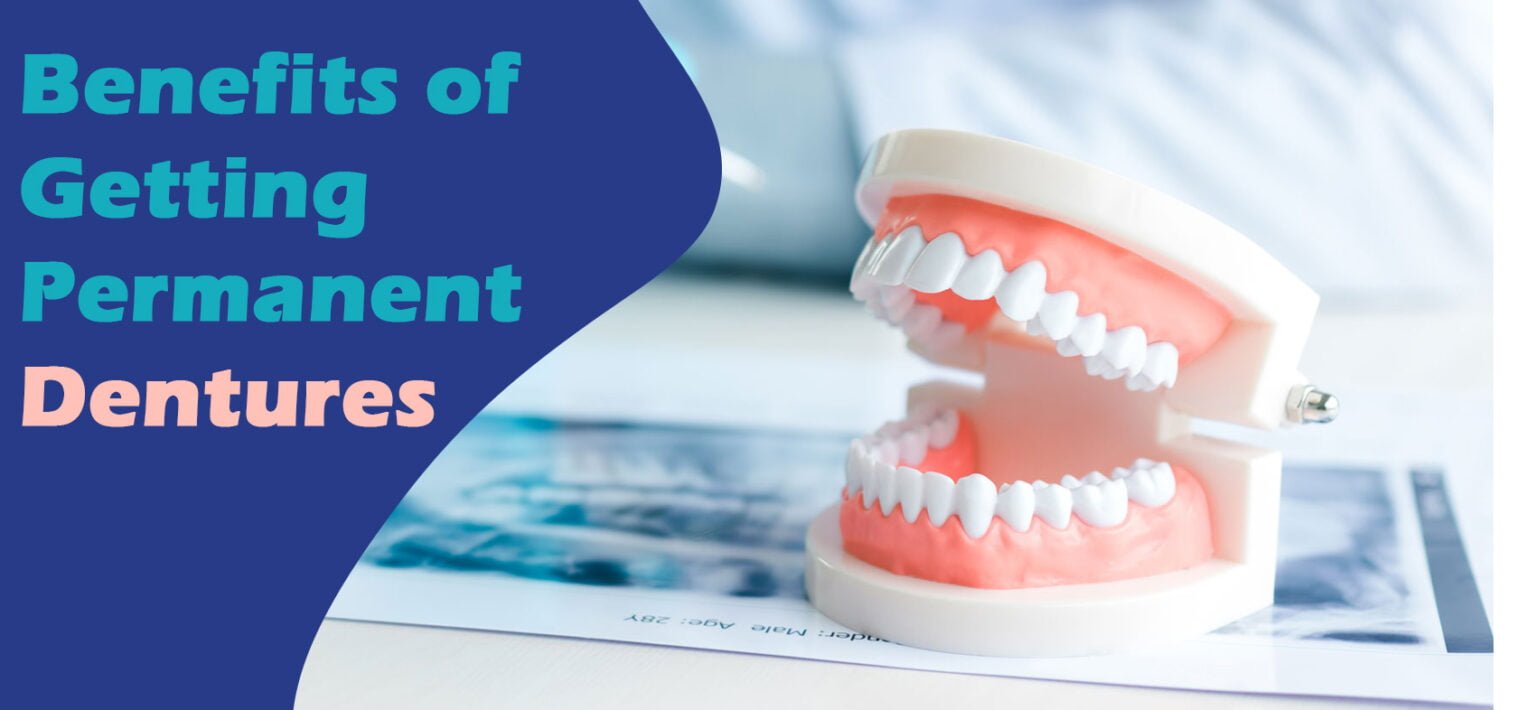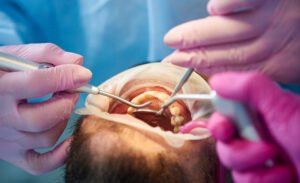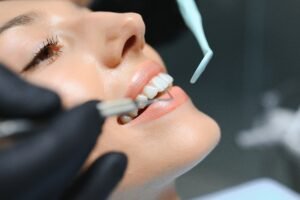Permanent dentures can be a great long-term tooth replacement option. Traditional, non-permanent dentures are familiar to most individuals. Permanent dentures are a newer choice with several advantages.
Permanent dentures will be put in place through dental implants, which act as ‘anchors.’ Permanent dentures take time, oral surgery, and are expensive, but they might be worth it. You can receive the treatment for dentures in Calgary.
Defining permanent dentures.
Permanent dentures are a long-term tooth replacement option. The dentures will align with the dental implants, which act as a substitute for your teeth’ roots. If dentures are inserted permanently and are not removable, they are also known as implant dentures or implant-supported dentures.
Read More: How can a dentist help you replace missing teeth?
Difference between traditional and permanent dentures.
Permanent dentures differ from regular, non-permanent dentures in a few ways. First and foremost, permanent dentures are rarely removable. Your dentist can expel them if he thinks it is necessary. This is not the same as non-permanent dentures, which must be removed every night.
Permanent dentures must be cleaned differently than regular dentures. Permanent dentures are cared for in the same way as natural teeth, including brushing and flossing. One should clean dentures every time they are taken out. Brushing them with a non-abrasive denture cleanser is the best method.
Must See: What are the ways to take care of your porcelain veneers?
Advantages of permanent dentures.
The irritation will be minimal in the long run.
Because one has to remove the traditional dentures often, they might cause gum irritation over time. Dentures that are too loose might allow food particles to sneak beneath them, causing discomfort when chewing. Traditional dentures can sometimes cause friction or pain if they are not correctly in place. Permanent dentures might be unpleasant at first, but your mouth will quickly change.
Check Now: How to take care of your oral hygiene while wearing braces?
It feels more like natural teeth.
Permanent dentures can mimic the feel and appearance of natural teeth. By having teeth that stay in the mouth at all times, permanent dentures provide a sense of normalcy.
They are unnoticeable.
Permanent dentures do not need to be taken out. Nobody will even notice that you have dentures on.
It becomes easier to care.
Permanent dentures, as previously said, require the same level of care as natural teeth. Brushing is all that is necessary for cleaning. It may be simpler to remember to clean your permanent dentures because it is now a habit for most individuals. You must not be anxious about forgetting to buy extra supplies, such as denture cleansing pills.
Read More: How to take care of your child’s oral health this summer?
More flexibility.
Traditional dentures can loosen their grip and firmness over time. Gums might shrink when you lose a substantial amount of weight. Dentures become loose and difficult to use as a result. Over time, ill-fitting dentures might be dangerous. Permanent dentures do not vary their grip over time since they can last long.
Treatment and recovery.
Permanent dentures are a multi-step procedure. It entails the implantation of dental implants to secure the dentures. The process involved three stages.
The teeth and jaw must first be ready for dental implants. Bone grafting may be useful to ensure that the jaw is robust enough to retain the implants in place after bad teeth removal.
Also Read: How long will your teeth whitening last after the treatment?
Now the dental implants process will take place. A dental implant is all about a post that keeps false teeth in place. Although some oral surgeons may prescribe general anesthesia, this step can be done with a local anesthetic. The operation will be conducted as an outpatient procedure, so you will not be required to remain overnight following the process.
The patient must wait a significant period between each step. It takes time for the mouth to recover and the dental implant fully functional. The entire process will take some time.
It will take a few weeks before you feel normal. The patient may have gum soreness, swelling, and bruising at first. One can expect this with most oral operations. Antibiotics and pain relievers may be useful during this process. The oral surgeon will provide all of this information on post-surgery care.
Read Also: What are the best habits to follow and avoid when experiencing tooth decay?
Things you should take care of post-surgery.
Permanent dentures require very modest surgery to install. While the operation itself is not dangerous, we want to make sure that the body is properly fed after that to speed up the healing process. Following surgery, seniors and their caregivers should be cautious of potential issues with wound healing, reduced intake, and limited food preparation.
Wound healing in the mouth.
After surgery, permanent dentures might create temporary wounds in the mouth. One will have to keep their mouth clean to expect a quick recovery. Brushing your teeth and washing your mouth regularly will help.
A balanced diet will also help wounds heal more quickly. The denture wearer should consume enough protein as part of a well-balanced diet. They may have a greater protein demand, so talk to a dietician to ensure they are getting enough protein.
Weight loss and lack of appetite.
Because the procedure may result in oral wounds, the patient may eat less to minimize pain. Unfortunately, this lowered consumption might result in accidental weight loss, especially among the elderly.
To maintain our weight, we all need to consume a certain number of calories each day. We will begin to lose weight if we consume less than the minimum. This weight loss will impede the healing process and may have detrimental implications elsewhere in the body in someone who has recently obtained dentures.
Check Now: Everything you need to know about Invisalign before getting it done
Fatigue.
In the older generation obtaining permanent dentures, weariness is expected, as with any operation. Their bodies will devote more energy to healing than normal.
That senior may find it increasingly difficult to make meals for himself. If this happens, make sure that caretakers or family members are there to help.
Things you should consume.
It might be challenging to maintain enough oral intake when suffering from pain and weariness following dental implant surgery. On the other hand, a good diet will assure a speedy recovery. We want patients to eat enough following surgery, so here are some suggestions for increasing oral intake and avoiding malnutrition and accidental weight loss.
Bland diet.
The soft diet consists of smooth meals that need little chewing. Mashed potatoes, eggs, and soft-cooked vegetables are examples of soft foods. Foods that have been pureed are also beneficial. These meals are gentle on the mouth while it recovers after surgery. Although the soft diet might become monotonous in texture, a wide range of meals helps keep the diet interesting.
Fresh fruits and vegetables may be useful to brighten up your meals. Herbs and spices can also enhance the flavour of your dish. These suggestions will make your cuisine more appealing and enjoyable to consume.
Read More: Why should you take your child to the dentist regularly?
High-calorie drinks.
High-calorie smoothies are a fantastic approach to increase calorie intake following surgery. It’s frequently more convenient to drink a smoothie than to eat a complete meal. Liquids can also be less uncomfortable to eat since they do not need chewing.
Conclusion.
Permanent dentures can be quite beneficial to older people. They provide a variety of social advantages and assist persons in maintaining a sufficient oral intake. Permanent dentures might be the key to a brighter life ahead of you. If you are thinking about getting permanent dentures, visit a dental clinic in Calgary. Before receiving the permanent denture treatment, visit your dentist.
Also Read Why Are Regular Visits to Your Dentist Crucial to Your Oral Health?















